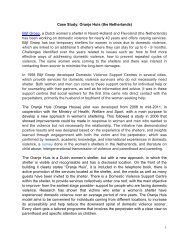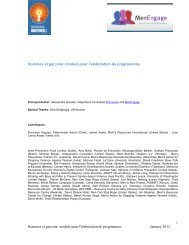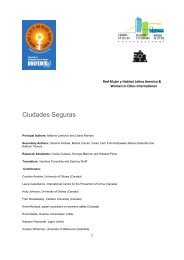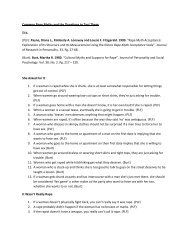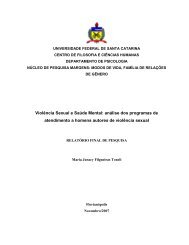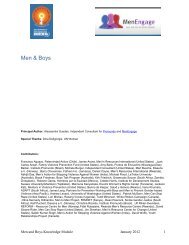Campaigns to End Violence against Women and Girls - Virtual ...
Campaigns to End Violence against Women and Girls - Virtual ...
Campaigns to End Violence against Women and Girls - Virtual ...
Create successful ePaper yourself
Turn your PDF publications into a flip-book with our unique Google optimized e-Paper software.
facilita<strong>to</strong>r introduces the subject, keeps the discussion going, <strong>and</strong> ensures all<br />
participants contribute <strong>to</strong> the discussion <strong>and</strong> no one dominates it.<br />
Ethics: When organizing focus groups with representatives of the “general public”, it<br />
may be advisable <strong>to</strong> tell potential participants that their opinions are needed on a health<br />
issue, rather than on VAW, so as <strong>to</strong> avoid alienating potential participants who have<br />
negative preconceptions about discussing VAW. Take utmost care especially when<br />
organizing focus groups with survivors of violence – ethical considerations must apply.<br />
See Guiding principles in this module. Bear in mind that a large proportion of female<br />
participants may have been exposed <strong>to</strong> VAW, even if they do not identify themselves as<br />
VAW survivors.<br />
Resource:<br />
� The Gender-based <strong>Violence</strong> Tools Manual for Assessment & Programme Design,<br />
Moni<strong>to</strong>ring <strong>and</strong> Evaluation in Conflict Affected Settings (2003) by the<br />
Reproductive Health Response in Conflict Consortium includes detailed guidance<br />
on focus group discussions.<br />
Example: An impact evaluation of the second phase of Sex<strong>to</strong> Sentido, ‘We’re Different<br />
We’re Equal’ (a weekly “soap opera” by Pun<strong>to</strong>s de Encuentro on Nicaraguan<br />
commercial television promoting change in the social context in which young people<br />
make decisions, <strong>and</strong> negotiate their identities, relationships <strong>and</strong> sexuality) was carried<br />
out in partnership with PATH, Leon University <strong>and</strong> the USAID Horizons Project. The<br />
research team informed participants in interviews <strong>and</strong> focus groups at every phase of<br />
the data collection of (i) the nature <strong>and</strong> relevance of their participation in the research,<br />
(ii) contact persons in case any issues should arise, (iii) the need <strong>to</strong> have participants’<br />
explicit consent <strong>to</strong> being interviewed, d) the option <strong>to</strong> withdraw from participating at any<br />
stage of the research. At the end of each interview, participants received information<br />
materials on VAW <strong>and</strong> contact details of relevant local services.<br />
The full evaluation report is available in Spanish: Propici<strong>and</strong>o cambio personal y social<br />
alrededor del género, sexualidad y VIH: Evaluación de impac<strong>to</strong> de la estrategia de<br />
comunicación de Pun<strong>to</strong>s de Encuentro, Pun<strong>to</strong>s de Encuentro, CIDS/UNAN León, PATH,<br />
Horizons Program (2008).<br />
Read the Case Study <strong>and</strong> Evaluation (in Spanish).<br />
Rapid assessment surveys <strong>and</strong> mini-surveys<br />
Rapid assessment surveys can be used <strong>to</strong> gather information on knowledge, attitudes,<br />
skills <strong>and</strong> behaviours related <strong>to</strong> VAW in a community. As with most <strong>to</strong>ols used in<br />
community development programmes, a single rapid assessment, while useful as a<br />
formative exercise, does not fulfill high st<strong>and</strong>ards of scientific rigor. Instead, carrying out<br />
several such assessments over time or with different groups is likely <strong>to</strong> yield sufficient<br />
insights for effective campaign planning <strong>and</strong> implementation. For a sample rapid<br />
assessment survey, see the SASA! Toolkit (Tips Booklet) by Raising Voices.<br />
Mini surveys are usually based on a short, structured questionnaire of st<strong>and</strong>ardized<br />
questions. They tend <strong>to</strong> be administered <strong>to</strong> 25 <strong>to</strong> 50 people at a time. One can select<br />
270<br />
<strong>Campaigns</strong> December 2011



